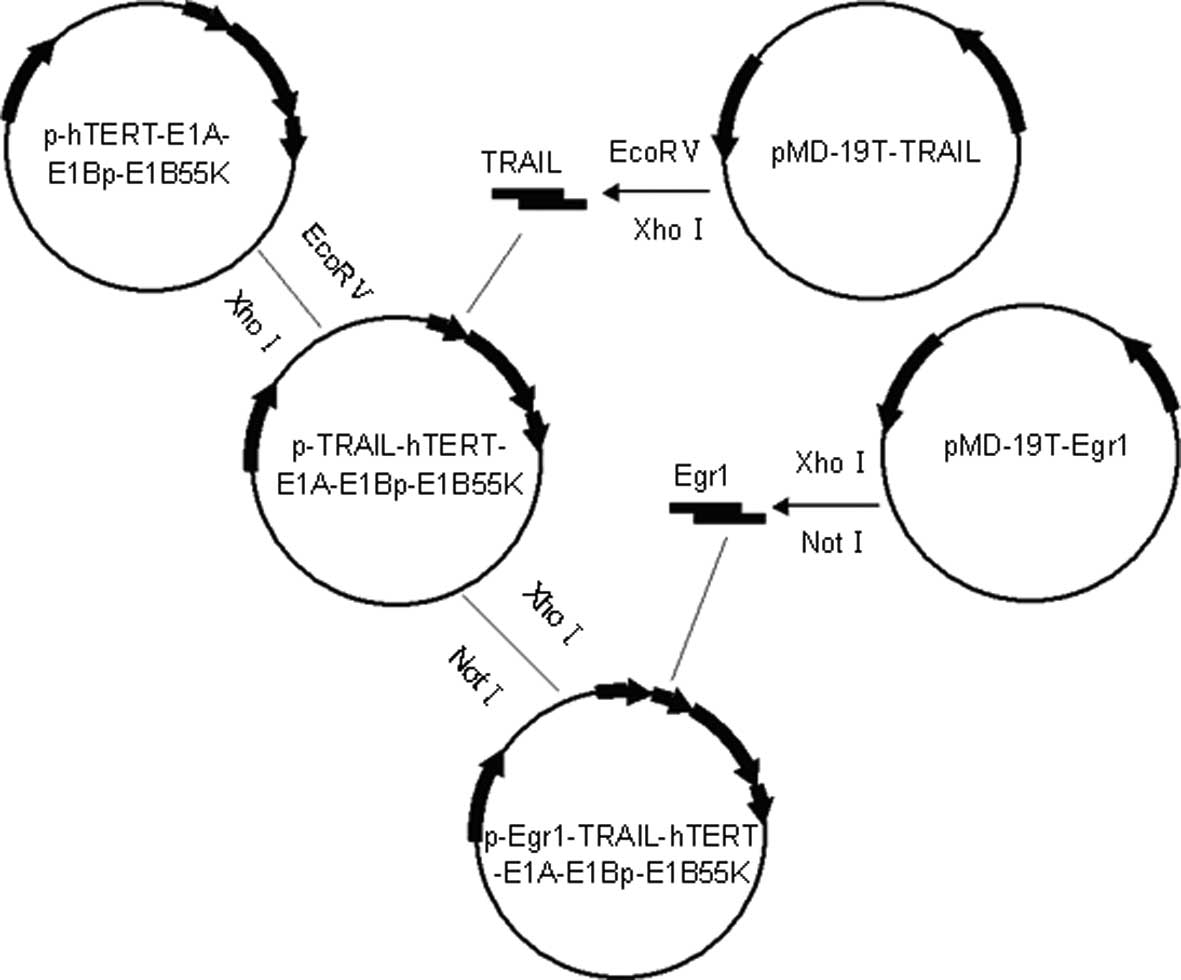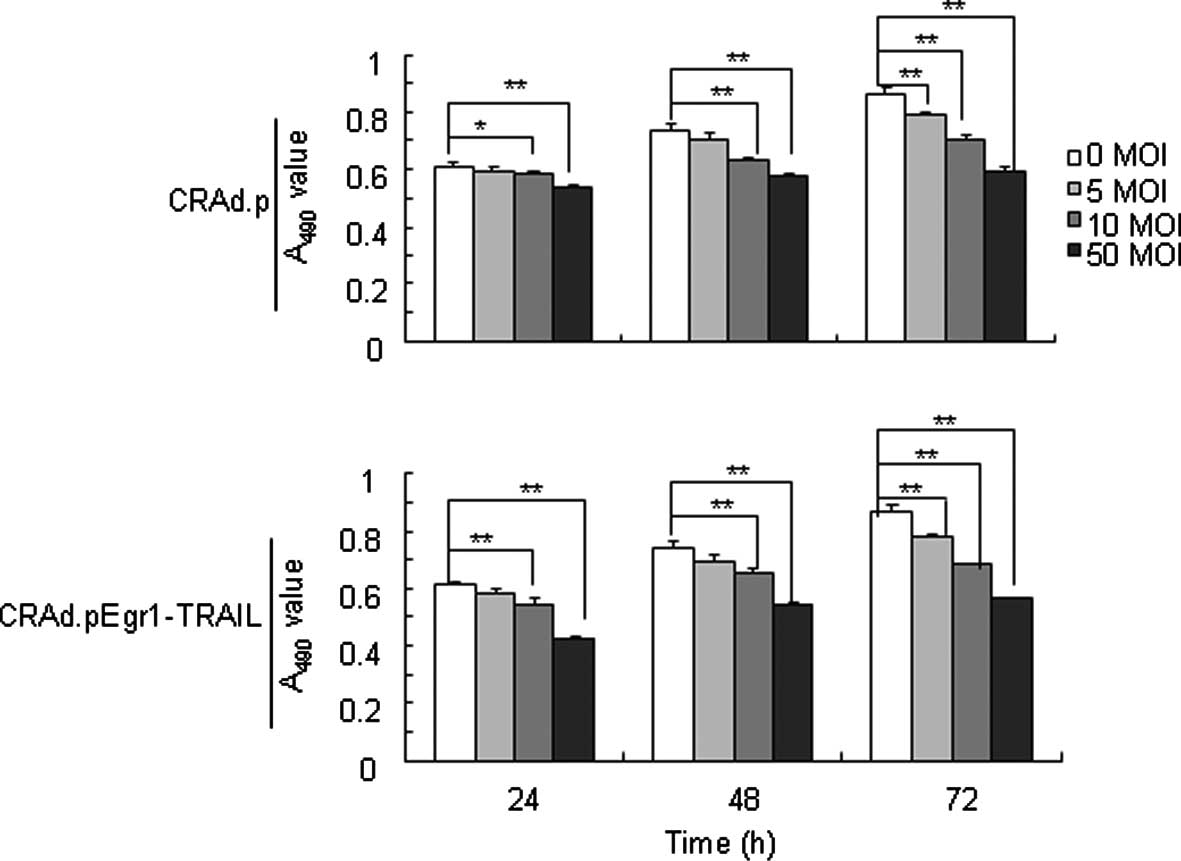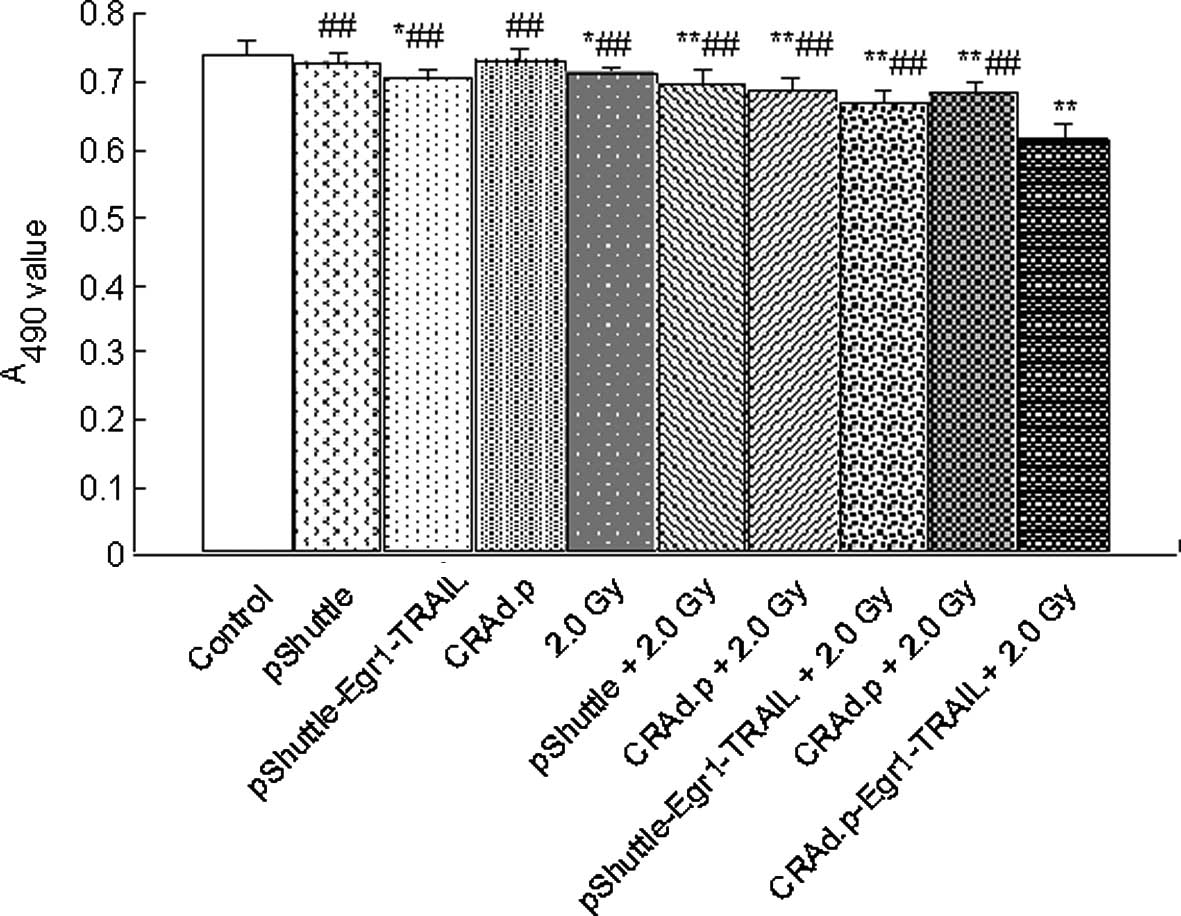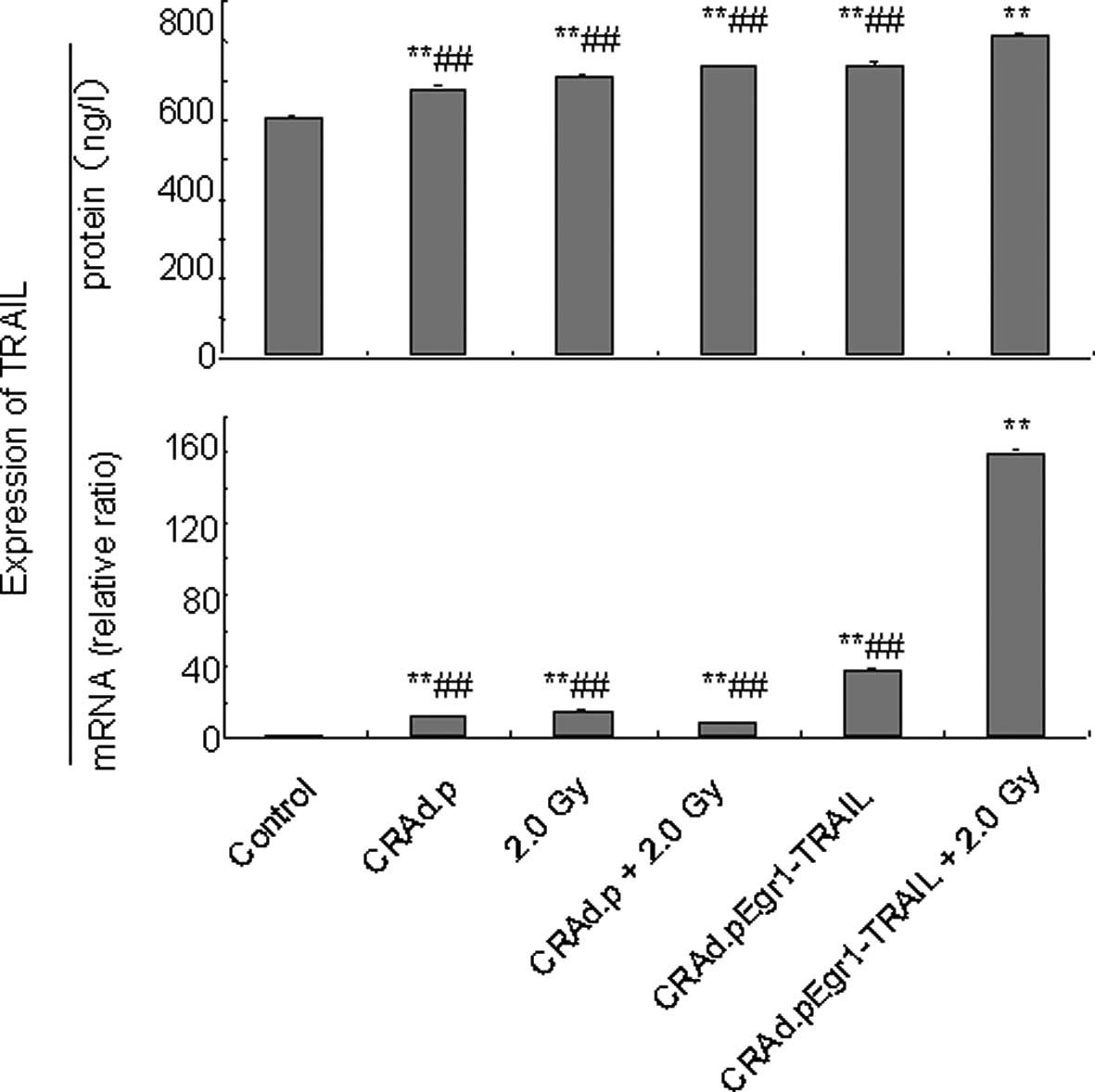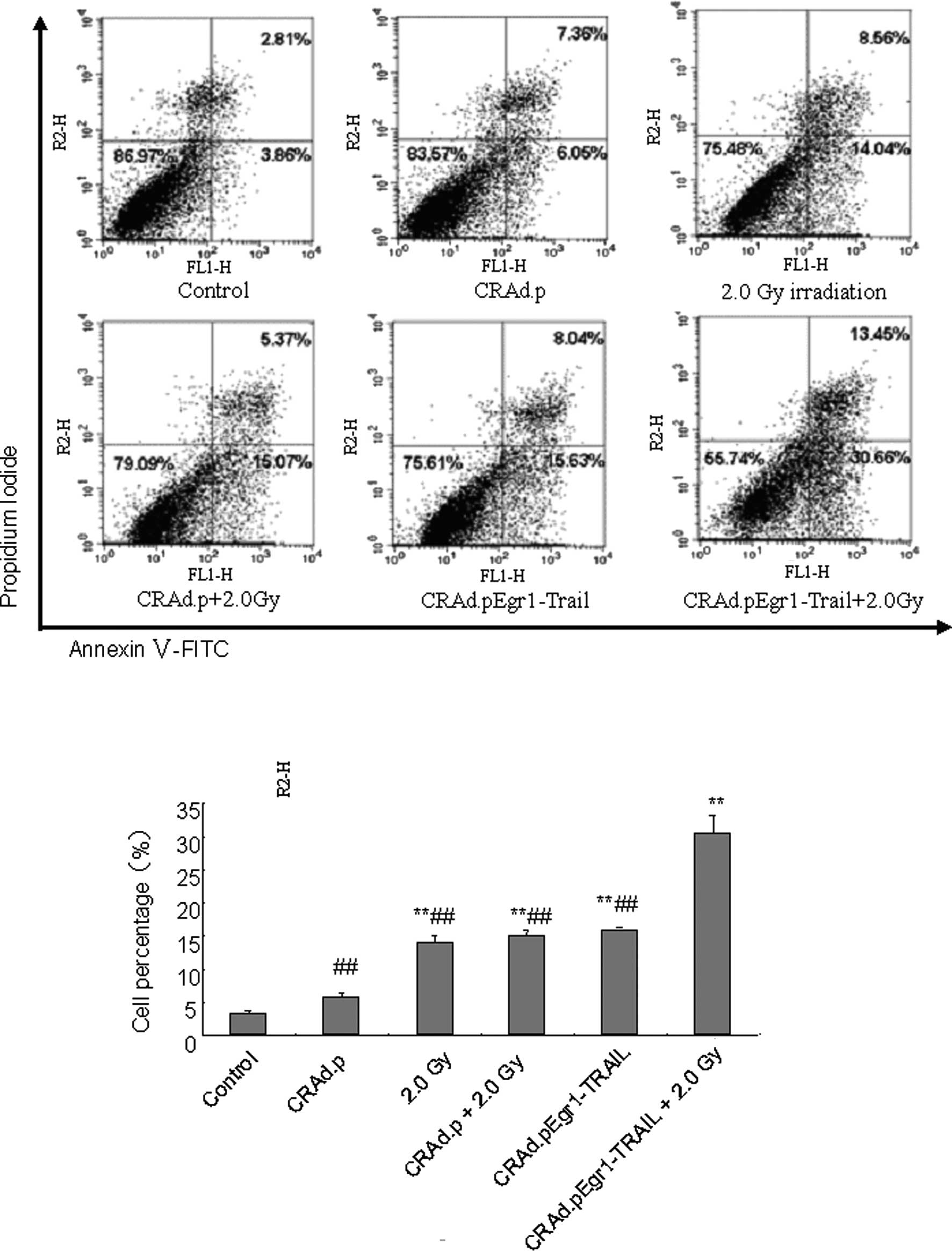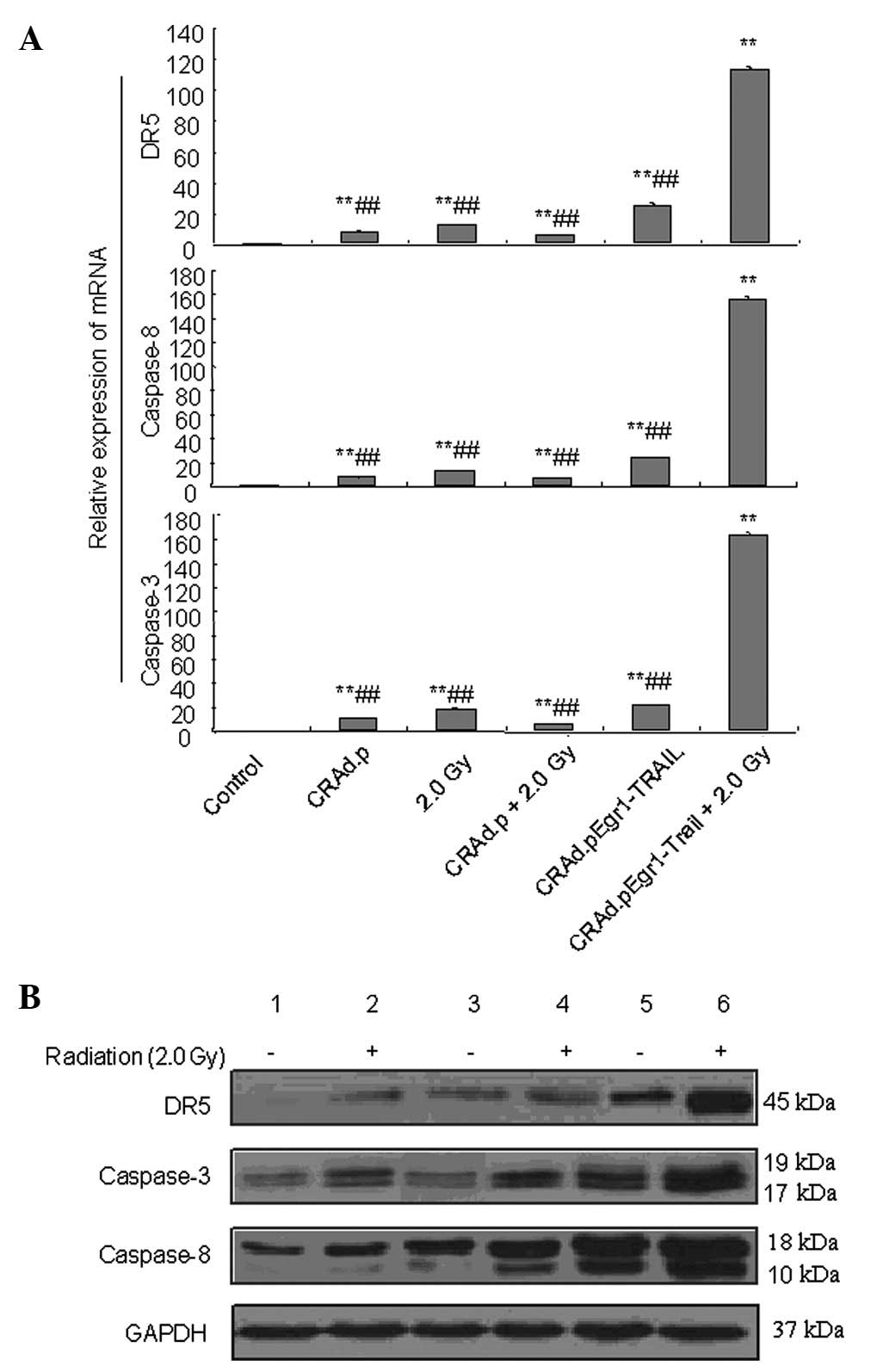|
1
|
Weichselbaum RR, Kufe DW, Advani SJ and
Roizman B: Molecular targeting of gene therapy and radiotherapy.
Acta Oncol. 40:735–738. 2001. View Article : Google Scholar : PubMed/NCBI
|
|
2
|
Sukhatme VP, Cao XM, Chang LC, et al: A
zinc finger-encoding gene coregulated with c-fos during growth and
differentiation, and after cellular depolarization. Cell. 53:37–43.
1988. View Article : Google Scholar : PubMed/NCBI
|
|
3
|
Manente AG, Pinton G, Tavian D,
Lopez-Rodas G, Brunelli E and Moro L: Coordinated sumoylation and
ubiquitination modulate EGF induced EGR1 expression and stability.
PLoS One. 6:e256762011. View Article : Google Scholar : PubMed/NCBI
|
|
4
|
Du N, Pei XT, Zhou JM, Zhao H, Li XS, Fu Y
and Hao YX: Transcriptional control of Flt3 ligand targeted by
fluorouracil-induced Egr-1 promoter in hematopoietic damage. J
Biomed Sci. 16:852009. View Article : Google Scholar : PubMed/NCBI
|
|
5
|
Marignol L, Coffey M, Hollywood D and
Lawler M: Radiation to control transgene expression in tumors.
Cancer Biol Ther. 6:1005–1012. 2007. View Article : Google Scholar : PubMed/NCBI
|
|
6
|
Weichselbaum RR, Hallahan DE, Beckett MA,
Mauceri HJ, Lee H, Sukhatme VP and Kufe DW: Gene therapy targeted
by radiation preferentially radiosensitizes tumor cells. Cancer
Res. 54:4266–4269. 1994.PubMed/NCBI
|
|
7
|
Weichselbaum RR, Halahan DE, Sukhatme VP
and Kufe DW: Gene therapy targeted by ionizing radiation. Int J
Radiat Oncol Biol Phys. 24:565–567. 1992. View Article : Google Scholar : PubMed/NCBI
|
|
8
|
Weichselbaum RR: Growth factors alter the
therapeutic ratio in radiotherapy. Cancer J Sci Am. 1:28–29.
1995.PubMed/NCBI
|
|
9
|
Weichselbaum RR and Kufe D: Gene therapy
of cancer. Lancet. 349:51110–51112. 1997. View Article : Google Scholar
|
|
10
|
Yang SW, Chanda D, Cody JJ, Rivera AA,
Waehler R, Siegal GP, Douglas JT and Ponnazhagan S: Conditionally
replicating adenovirus expressing TIMP2 increases survival in a
mouse model of disseminated ovarian cancer. PLoS One. 6:e251312011.
View Article : Google Scholar : PubMed/NCBI
|
|
11
|
Zheng FQ, Xu Y, Yang RJ, Wu B, Tan XH, Qin
YD and Zhang QW: Combination effect of oncolytic adenovirus therapy
and herpes simplex virus thymidine kinase/ganciclovir in hepatic
carcinoma animal models. Acta Pharmacol Sin. 30:617–627. 2009.
View Article : Google Scholar
|
|
12
|
Yu W and Fang H: Clinical trials with
oncolytic adenovirus in China. Curr Cancer Drug Targets. 7:141–148.
2007. View Article : Google Scholar : PubMed/NCBI
|
|
13
|
Yang SW, Cody JJ, Rivera AA, Waehler R,
Wang M, Kimball KJ, Alvarez RA, Siegal GP, Douglas JT and
Ponnazhagan S: Conditionally replicating adenovirus expressing
TIMP2 for ovarian cancer therapy. Clin Cancer Res. 17:538–549.
2011. View Article : Google Scholar : PubMed/NCBI
|
|
14
|
Barnes MN, Coolidge CJ, Hemminki A,
Alvarez RD and Curiel DT: Conditionally replicative adenoviruses
for ovarian cancer therapy. Mol Cancer Ther. 1:435–439.
2002.PubMed/NCBI
|
|
15
|
Gómez-Navarro J and Curiel DT:
Conditionally replicative adenoviral vectors for cancer gene
therapy. Lancet Oncol. 1:148–158. 2000.
|
|
16
|
Paupoo AA, Zhu ZB, Wang M, Rein DT,
Starzinski-Powitz A and Curiel DT: A conditionally replicative
adenovirus, CRAd-S-pK7, can target endometriosis with a
cell-killing effect. Hum Reprod. 25:2068–2083. 2010. View Article : Google Scholar : PubMed/NCBI
|
|
17
|
Kimball KJ, Preuss MA, Barnes MN, et al: A
phase I study of a tropism-modified conditionally replicative
adenovirus for recurrent malignant gynecologic diseases. Clin
Cancer Res. 16:5277–5287. 2010. View Article : Google Scholar : PubMed/NCBI
|
|
18
|
Wiley SR, Schooley K, Smolak PJ, et al:
Identification and characterization of a new member of the TNF
family that induces apoptosis. Immunity. 3:673–682. 1995.
View Article : Google Scholar : PubMed/NCBI
|
|
19
|
Walczak H, Miller RE, Ariail K, et al:
Tumoricidal activity of tumor necrosis factor-related
apoptosis-inducing ligand in vivo. Nat Med. 5:157–163. 1999.
View Article : Google Scholar : PubMed/NCBI
|
|
20
|
Gores GJ and Kaufmann SH: Is TRAIL
hepatotoxic? Hepatology. 34:3–6. 2001. View Article : Google Scholar
|
|
21
|
Wang P, Song JH, Song DK, Zhang J and Hao
C: Role of death receptor and mitochondrial pathways in
conventional chemotherapy drug induction of apoptosis. Cell Signal.
18:1528–1535. 2006. View Article : Google Scholar : PubMed/NCBI
|
|
22
|
Mahalingam D, Szegezdi E, Keane M, de Jong
S and Samali A: TRAIL receptor signalling and modulation: are we on
the right TRAIL? Cancer Treat Rev. 35:280–288. 2009. View Article : Google Scholar : PubMed/NCBI
|
|
23
|
Kruyt FA: TRAIL and cancer therapy. Cancer
Lett. 263:14–25. 2008. View Article : Google Scholar : PubMed/NCBI
|
|
24
|
Smith RA, Cokkinides V, Brooks D, Saslow
D, Shah M and Brawley OW: Cancer screening in the United States,
2011: a review of current American Cancer Society guidelines and
issues in cancer screening. CA Cancer J Clin. 61:8–30. 2011.
View Article : Google Scholar : PubMed/NCBI
|
|
25
|
Marples B, Greco O, Joiner MC and Scott
SD: Radiogenetic therapy: strategies to overcome tumor resistance.
Curr Pharm Des. 9:2105–2112. 2003. View Article : Google Scholar : PubMed/NCBI
|
|
26
|
Ahmed MM: Regulation of radiation-induced
apoptosis by early growth response-1 gene in solid tumors. Curr
Cancer Drug Targets. 4:43–52. 2004. View Article : Google Scholar : PubMed/NCBI
|
|
27
|
Crompton AM and Kim DH: From ONYX-015 to
armed vaccinia viruses: the education and evolution of oncolytic
virus development. Curr Cancer Drug Targets. 7:133–139. 2007.
View Article : Google Scholar : PubMed/NCBI
|
|
28
|
Singh TR, Shankar S, Chen X, Asim M and
Srivastava RK: Synergistic interactions of chemotherapeutic drugs
and tumor necrosis factor-related apoptosis-inducing ligand/Apo-2
ligand on apoptosis and on regression of breast carcinoma in vivo.
Cancer Res. 63:5390–5400. 2003.
|















